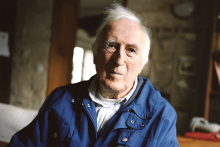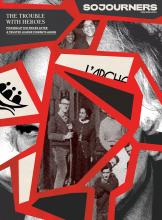Jean Vanier
Jean Vanier (1928 - 2019) was a Canadian spiritual leader and one of the founders of L'Arche, a network of international communities where people with and without intellectual disabilites live together. He was the author of numerous books on Christian spirituality, including Community and Growth and several articles for Sojourners. Nine months after his death, a report from L'Arche found that six women had credibly accused him of spiritual and sexual abuse.
In 2023, Sojourners published Lead Us Not, a podcast following those who once admired Jean Vanier as they try to understand: When trusted leaders commit sexual and spiritual abuse, how do our communities move forward?


L’Arche challenges the notion that a group home is predominantly a place to provide care services. We have learned over time that the health of our community is rooted in how we gather, celebrate, and make known the unique gifts of every person. This does not diminish the work of competent caregiving, but rather, it places it in a larger context that recognizes how ritual and gathering emphasize a person’s gifts and beauty rather than their diagnoses.

What is spiritual abuse in the church and how do we heal from it? Spiritual abuse is “a distortion and exploitation of spiritual authority to manipulate, control, use, or harm others, mostly through shame and fear,” Rachael Clinton Chen told Sojourners. The warning signs of spiritual abuse include intolerance for questions and doubts and using the Bible to arouse fear. Healing from spiritual abuse will be possible with time, therapy, and truth-telling among people who are known and trusted.

Immoral exemplars leave us to grapple with a host of difficult ethical questions. Among these are certainly questions about their status and the value of their work. But these are not the only — or even the most important — issues. We also must consider the concerns of survivors, the integrity of our most treasured traditions and institutions, and how our response might contribute to a more just world. When we focus solely on the status of the tainted thinker and their work, much of the ethical picture fades from view.

When prominent spiritual leaders are abusive, their violence hits like an earthquake. The victims are at the epicenter, but when the truth comes out, the rest of us feel the aftershocks.

I wish the world could read a thoroughly-researched, 900-page report from the women who Vanier preyed on; a full report, written in their own handwriting and spoken in their own voices about what he took from them. I wish the world could understand that the women are more than the sorrow brought about by this injustice. They are resilient, and whether we know them or not, their stories are a part of our story — the story of L’Arche as well as the broader human story.

Three women who were sexually and spiritually abused at L’Arche by Jean Vanier and Thomas Philippe tell their stories.

The guru effect. Magnetism. A “living saint.” Jean Vanier’s powerful presence made people feel seen, even transformed. But what role does charismatic leadership play in abuse?

In November 2018, an academic acquaintance in Canada phoned me with a dilemma. She had just heard about the 2015 canonical investigation by authorities in the Roman Catholic Church that concluded that Jean Vanier’s mentor, Thomas Philippe, had sexually abused women who came to him for spiritual direction, both before and during his years at L’Arche in France. This was a big problem: She was in the early stages of planning an invitation-only academic symposium about Vanier and his legacy. Should she go ahead?

We now know the founding story Jean Vanier told for decades isn't true. Host Jenna Barnett talks with L'Arche USA's Tina Boverman and author Carolyn Whitney-Brown as they try to untangle L'Arche's mission from Vanier's lies.

More than just an accounting of Vanier and Philippe’s abuse, the report offers a clear timeline and analysis of the secret intentions and motivations named by the two men and their accomplices. It also offers a look at the many figures who attempted to hold Vanier and Philippe accountable, or rein in their abuse.

A just-released, 900-page report uncovers new details about Jean Vanier's abuse. In light of this news, host Jenna Barnett changes plans for this episode and talks with Sojourners' Mitchell Atencio about what we know.

A report released today concluded that Jean Vanier — a Catholic lay leader and founder of L’Arche, a worldwide network of communities supporting adults with intellectual disabilities — founded the first L’Arche community primarily as a cover for a secretive religious sect with exploitative “mystical-sexual” beliefs and practices. The report also found Vanier sexually exploited at least 25 nondisabled women from 1952 until just before his death in 2019, far more than previously known.

Jean Vanier died in May 2019, a spiritual leader celebrated for his work with people with intellectual disabilities. But in February 2020, he died again — shaking the global network of communities he founded.

Listen to the trailer for Lead Us Not, a new podcast from Sojourners hosted by Jenna Barnett.

THIS IS ONE way to tell the founding story of L’Arche:
The main character is a sailor-turned-ethicist named Jean Vanier. The son of the governor general of Canada, he was, as his biographer Anne-Sophie Constant wrote, “a child of privilege, he had danced with princesses, dined with politicians and philosophers, and circled the world twice.”
As the story goes, Vanier gave all that up in 1964 when his spiritual mentor, Thomas Philippe, a Dominican priest, took him on a tour of the psychiatric facility where Philippe was a chaplain. There, Vanier discovered, as he put it, “an immense world of pain.” This is not an exaggeration: At the time, asylums, which were notorious for overcrowding and abuse, functioned more as prisons than treatment centers. Inside these walls, Vanier heard an invitation — from Jesus and the men with intellectual disabilities — to do something.
So Vanier bought a broken-down house in Trosly, France, and invited two men from the mental institution to live with him. He named the home “L’Arche,” French for “The Ark,” a biblical symbol of protection in a storm-tossed world. Vanier traveled around the globe to tell the story of their life together, and soon L’Arche communities sprouted up in Canada, India, Australia, Haiti, and beyond — a constellation of communities where adults with and without intellectual disabilities have aspired to live, work, pray, and play together as equals. L’Arche became integral to the movement for the deinstitutionalization of people with intellectual disabilities, and Vanier became a best-selling Christian writer and hero to all of us looking to practice a faith that prioritized those on the margins.
When he was introduced to give lectures, Vanier often said, “I feel uncomfortable when people say nice things about me.” Yet the world had lots of nice things to say, bestowing upon Vanier countless awards, including the French Legion of Honor, the Companion of the Order of Canada, and the Templeton Prize. But for me, a certain 2010 accolade feels the most poignant: Astrophysicist C.J. Krieger discovered an asteroid and named it after Vanier. Vanier is above us; Vanier spins on a different celestial plane than the rest of us.
Before he died, Vanier was often called a living saint. Upon his death in 2019, Pope Francis sent his sympathies, asking Jesus to welcome Vanier into heaven as his faithful servant. It’s the type of eulogizing that you expect for someone who saw beauty and divinity where others saw shame and destitution.
It’s an inspiring story that changed thousands of lives: At the time of Vanier’s death, there were 147 L’Arche communities in 37 countries, home to approximately 10,000 people with intellectual disabilities. The protagonist of the story also saved my faith, showing me how Christianity is capable of destabilizing dangerous institutions, rocking the boat, building new arks.
Unfortunately, it’s a bad story.


Charismatic leaders such as Jean Vanier can inspire and transform us. But when these leaders commit abuse, how do the movements they ignite pick up the pieces?

MEN OF POWER have always abused that power. Every woman knows it, which is why none of us were surprised when #MeToo came for the church. But we weren’t prepared for Jean Vanier.
The details of Vanier’s story are well known by now, but they bear repeating. Vanier, who died in May 2019 at the age of 90, was the internationally celebrated co-founder of L’Arche, a global network of homes where people with and without intellectual disabilities live together in community. A Roman Catholic layperson who never married, Vanier was regarded by many as a living saint; his New York Times obituary hailed him as “Savior of People on the Margins.” His writings on spirituality and community were best sellers and universally revered as modern classics.
Vanier was also a sexual predator. A report following a posthumous investigation by L’Arche International, the organization that Vanier founded, revealed that he sexually abused at least six women in his spiritual care between 1970 and 2005. These six cases are the ones we know about. The women, none of whom knew each other, offered remarkably similar accounts of Vanier’s strategy of sexual predation within the context of spiritual direction.
L’Arche’s summary report is excruciating to read, because it reveals a pattern of manipulation and exploitation shot through Vanier’s role as a spiritual director. “He told me that this was part of the [spiritual] accompaniment,” one survivor reported. Even as she told him she was struggling to “distinguish what was right and what was wrong,” he pushed on, offering bizarre scriptural warrant from the Song of Solomon and—perhaps most chillingly—his contention that in their sexual interaction, “This is not us, this is Mary and Jesus.”

On Saturday, L’Arche International — a network of more than 154 communities in 38 countries where people with intellectual disabilities and those without intellectual disabilities live together in community to "work together to build a more human society" — announced the results of an investigation it commissioned last year into L’Arche founder Jean Vanier, who died in 2019. The investigation revealed that that Vanier “has been accused of manipulative sexual relationships and emotional abuse between 1970 and 2005, usually within a relational context where he exercised significant power and a psychological hold over the alleged victims,” as Tina Bovermann, Executive Director of L’Arche USA put it in a letter describing the investigation and its findings.
Can you convert a climate denier, the first woman president of New York Theological Seminary, the legacy of Jean Vanier, and more in the Weekly Wrap.